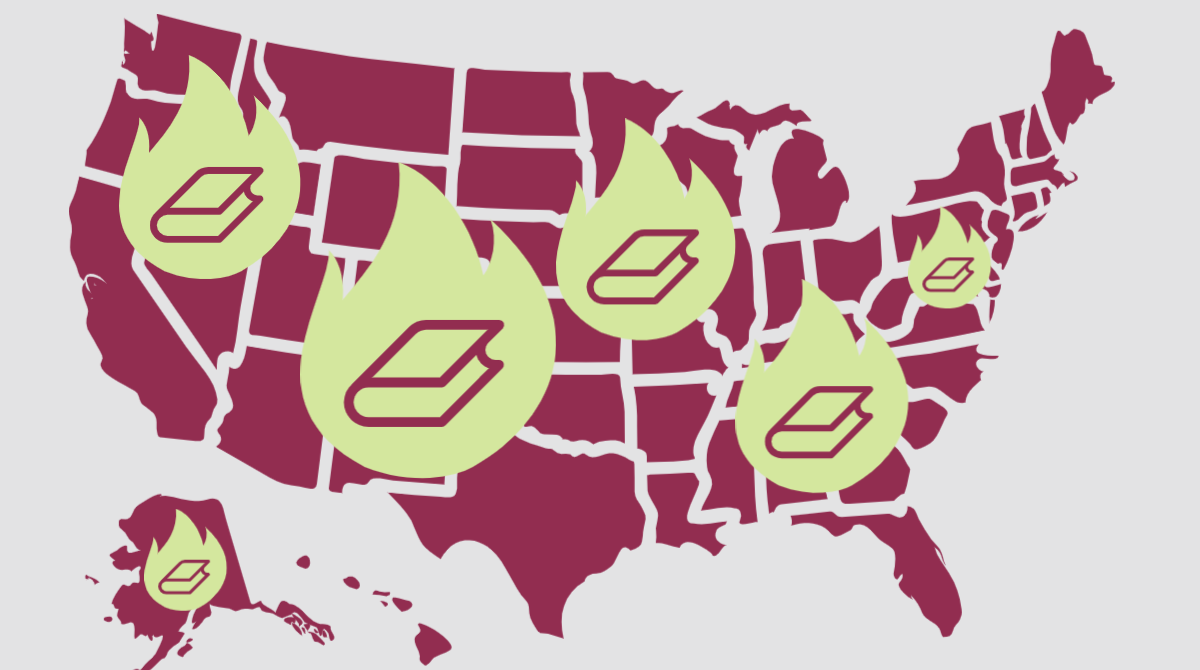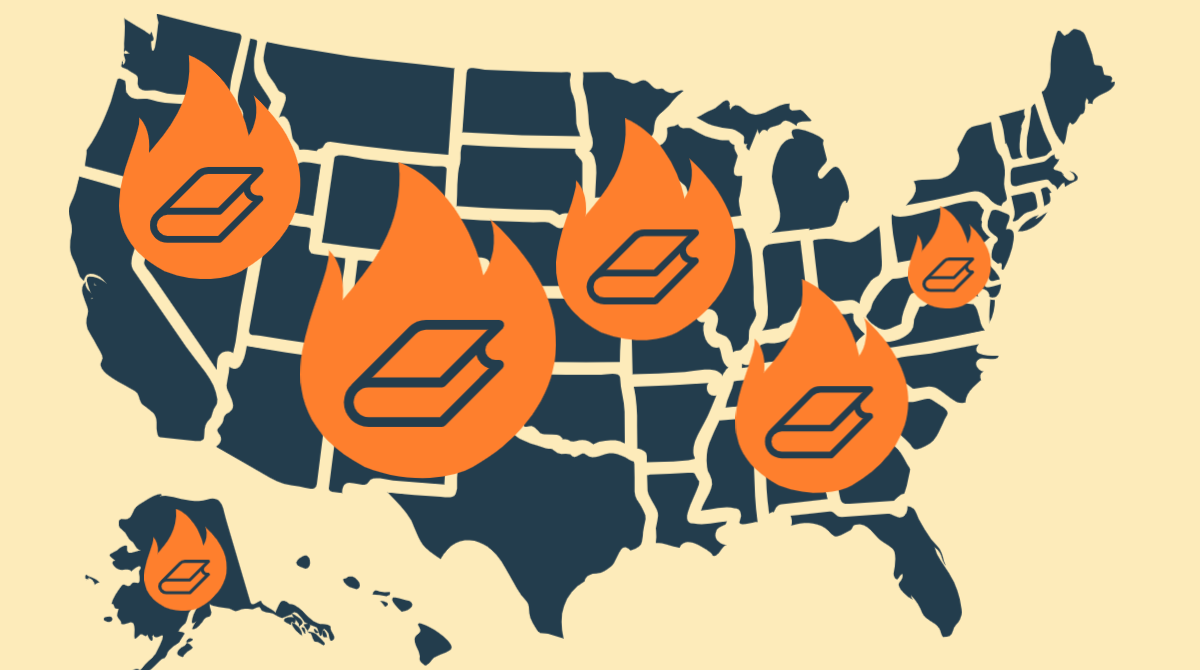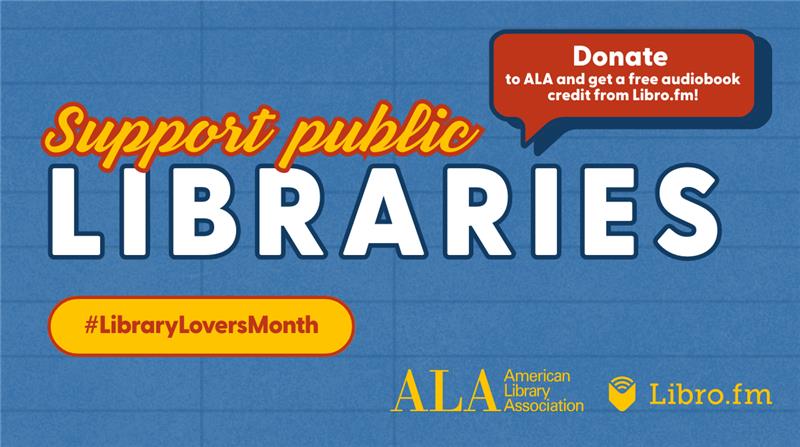Libraries and schools across the country are experiencing unprecedented levels of attempts to ban or remove books from their shelves. I Love Libraries will continue to raise awareness by highlighting attempts to censor library materials, as well as efforts by librarians, parents, students, and concerned citizens to push back against them. This report includes news from Iowa, Utah, and California, and a look at pop singer Pink’s efforts to fight book bans.
Pink gives away 2,000 banned books at Florida concerts
Grammy-winning pop singer Pink gave away 2,000 challenged books at her concerts in Miami and Sunrise Florida this week, reports NPR.
The giveaway is being conducted in collaboration with PEN America and Florida bookseller Books & Books and features books that have appeared on PEN America’s Index of Banned Books: Beloved by Toni Morrison, Amanda Gorman’s The Hill We Climb, Girls Who Code by Reshma Saujani, and Todd Parr’s The Family Book. The first 1,000 fans at each show received new copies of the books.
“It’s confusing, it’s infuriating, it is censorship,” Pink said in an Instagram video announcing her action on November 13. The video has been liked more than 33,000 times.
View this post on Instagram
Pink’s partnership comes as Florida has implemented laws limiting free speech in education in recent years, such as the Individual Freedom Act, which limits how systemic racism and discrimination is taught in schools and the workplace. Last year, Governor Ron DeSantis also signed legislation, which has been colloquially called the “Don’t Say Gay” bill, to limit discussion of LGBTQ+ topics in schools.
Voters in Iowa town reject vote to give their city council more control over library books
Voters in Pella, Iowa, decided not to support giving their city council more power over their local library, reports the Associated Press.
Just more than half the voters in the small town rejected an advisory vote on whether the council should have more power over how the library spends its money and whether it pulls certain books from shelves. Only 87 votes separated the two sides.
The measure got on the ballot after a group of Pella residents asked the library board to either remove Maia Kobabe’s memoir Gender Queer or have it behind the checkout counter where kids can’t get it. They objected to its depiction of the author’s real-life journey with sexuality and gender that includes frank sexual images. The board decided to keep the book in the adult section of the library instead.
Opponents of the measure persuaded voters that it’s better to keep the library insulated from politics. The city council-appointed library board has control over spending, who to hire as director and whether to remove books that are challenged. The council sets the budget.
“The current (library) system we have right now is a far more equitable system,” said Anne McCullough Kelly, chair of the Vote NO committee. “It’s not influenced by politics. And that keeps it a resource that serves, that equitably serves, all of the citizens of this community.”
Banning books from Utah schools statewide may get easier
A Utah lawmaker wants to make it easier to ban books from schools statewide, reports the Salt Lake City Tribune. The plan proposed by West Jordan Republican Rep. Ken Ivory would trigger the removal of a single title from all Utah schools if at least three school districts in the state found it to be “objective sensitive material,” or if at least two districts and five charter schools did.
Ivory’s draft proposal, which passed its initial committee with a 10-4 party-line vote, would also allow elected officials who represent “all or part” of where a school district or charter school sits to challenge whether a title should be available to students. Current law allows only those affiliated with a school or school district to do so.
Sen. Kathleen Riebe, one of four Democrats to oppose the Ivory’s draft, expressed concern that the proposed two district-five charter threshold would mean that two smaller school districts could help influence state action. She said that it a reality she called unbalanced, because the districts may not represent a majority of Utah students.
“Two small districts would actually determine the parents’ rights of the whole entire state,” Riebe said. “That’s not okay.”
School board in California votes to create panel with power to ban books it deems “sexually inappropriate”
Chino Valley (Calif.) Unified School Board has voted to create a process that could lead to books and other teaching materials getting pulled from school libraries over “sexually obscene” content, reports KTLA.
The policy was enacted November 16 and spells out how schools can deal with complaints lodged by parents and students. When someone lodges a complaint, the student is first excused from using the material in question, the new policy states. A panel comprised of administrators, teachers, librarians, and community members from the district could then decide to remove the material permanently.
The reasons teaching material could get banned include not being deemed “age-appropriate,” being “contrary to the moral and ethical standards generally held by the community,” or presenting “one-sided” political views.
Chino Valley’s conservative board enacted a controversial policy in July that would have required schools to notify parents if their child was identifying as transgender. A judge blocked the policy after California’s Attorney General sought a temporary restraining order.
Take action
Alarmed by the escalating attempts to censor books? Here are five steps you can take now to protect the freedom to read.
- Follow news and social media in your community and state to keep apprised of organizations working to censor library or school materials.
2. Show up for library workers at school or library board meetings and speak as a library advocate and community stakeholder who supports a parent’s right to restrict reading materials for their own child but not for all
3. Help provide a safety net for library professionals as they defend intellectual freedom in their communities by giving to the LeRoy C. Merritt Humanitarian Fund.
4. Educate friends, neighbors, and family members about censorship and how it harms communities. Share information from Banned Books Week.
5. Join theUnite Against Book Bans movement and visit our Fight Censorship page to learn what you can do to defend the freedom to read in your community.


